Tel Aviv (Hebrew: תל אביב, Arabic: تل أبيب) is the second largest city in Israel (after Jerusalem), and the largest metropolitan area. It is on the Mediterranean coast, about 60 km northwest of Jerusalem and 100 km south of Haifa. The official name is Tel Aviv-Yafo (תל אביב-יפו), and reflects the fact that the city has grown beside (and absorbed) the ancient port city of Yafo (English: Jaffa, Arabic: يافا Yafa), to the south of the new city center. Tel Aviv is home to most foreign embassies in Israel.
Tel Aviv is a rapidly growing city in the midst of an exciting transition from medium-sized urban center to bustling international metropolis. Its booming population, energy, edginess and 24-hour lifestyle give the city a cosmopolitan flair comparable to few other cities in this part of the world.
Tel Aviv is not really divided into districts, but rather into over 50 different neighborhoods. Some neighborhoods are really distinctive areas with different cultures (e.g. Neve Tzedek, Florentin, Ramat-HaHayal), while others are simply indicating a geographical area. Tel Aviv grew mainly from the south to the north, so the further you go to the north you will encounter newer buildings and wealthier communities.
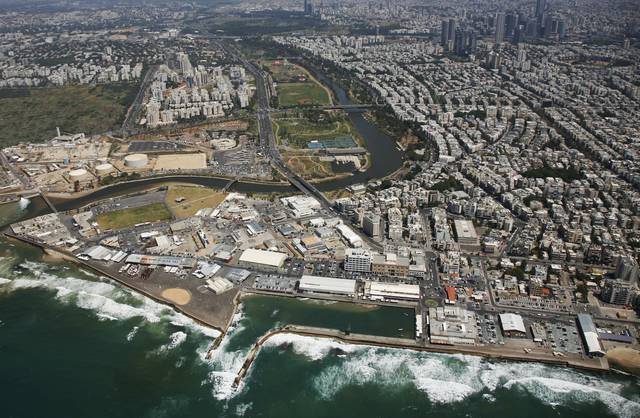
The smallish gulf of Jaffa was the site of a fortified port town for at least 4000 years. During the 19th century the town’s population grew from about 2,500 (1806) to 17,000 (1886). The old city walls could no longer contain the population, and they were destroyed in the 1870s. New, more spacious neighborhoods started to appear.
Tel Aviv (meaning literally "Hill of Spring") was founded in 1909 by a group of distinguished Jewish residents of Jaffa. They envisaged a European-style garden suburb, with wide streets and boulevards. Leaving Jaffa wasn’t, however, only a question of an upgrade in lifestyle. Moving out of the Arab-dominated town also represented their belief in the Jewish national movement, Zionism. Before being a city, Tel Aviv was one of the many titles of Theodor Herzl's utopian Zionist book - The Old New Land. Setting out with a grand vision, the 60 Tel Aviv founders started out by building the first mid-eastern urban center with running water, no small wonder in that part of the world in 1909. Houses from this period can still be seen in the Neve Tzedek neighborhood.
Tel Aviv grew steadily under Ottoman law until World War I. By the end of the war the British took over the Holy Land: an event the Jewish community saw as encouraging, while the Muslim community viewed it as a turn for the worse after Islamic rule. Tel Aviv was seen by nearby Arabs as a symbol of the growing Jewish presence in their homeland. In May 1921, an Arab mob attacked a Jewish immigration center, killing dozens of Jews. Another group broke the windows of stores in the Jewish street in Jaffa, and a mob armed with knives and sticks made its way towards Tel Aviv. Before 1921 most Jews worked and lived in Jaffa; after the attack, thousands of the 16,000 Jews of Jaffa moved north to Tel Aviv. The suburb had become a city and within a decade, Tel Aviv had become the center of culture, commerce and light industry for the entire Jewish population of the country (and the British soldiers). 1938 marked the opening of Tel Aviv port, an important milestone in the end of its dependency on Jaffa. By this time, Tel Aviv was already the biggest city in the country, with 130,000 residents. After Israel’s declaration of independence in 1948, Jaffa became a district of Tel Aviv and the city's name was officially changed to Tel Aviv-Yafo.
Today, Tel Aviv-Yafo is the heart of a thriving metropolis. The greater metropolitan area is home to approximately 3.1 million people, with around 392,700 in Tel Aviv-Yafo itself, making it the second largest city in Israel after Jerusalem. Major suburbs of Tel Aviv include Bat Yam, Holon, Ramat Gan, Givatayim, Bnei Brak, Petah Tikva, Rishon LeZion, Ramat HaSharon, Rehovot and Herzliya. The entire metropolitan area is often referred to as Gush Dan.
While Jerusalem is Israel's capital city, where most government departments are, Tel Aviv and its satellite cities form the economic and cultural center. Tel Aviv is known as "the city that doesn't stop", and you will find that the nightlife and culture are active around the clock. In summer it is not unusual to see the beach boardwalk bustling with people at 04:00, and the clubs and bars usually pick up around midnight until morning, giving Tel Aviv a well deserved reputation of being a party town. It is the pinnacle of secular life in Israel.
Tel Aviv is likely the most liberal city in Israel and in the Middle East - as it is no less liberal than the major cities of Western Europe. It has a bustling civil society and is home to many activist movements and NGOs. Its residents tend to have liberal attitudes towards gay and lesbian rights, and, in fact, Tel Aviv hosts the largest gay pride parade in Israel. It is also a destination for gay Palestinian refugees, unable to pursue their lifestyle in the Palestinian territories. With its liberalism comes a dose of sophistication and some will say detachment, and Tel Aviv is often dubbed "The Bubble" or "Medinat Tel Aviv" ("The State of Tel Aviv") by residents and non-residents alike. Some ultra-Orthodox Israelis have even dubbed the city a modern day "Sodom and Gomorrah", due to its hedonistic reputation.
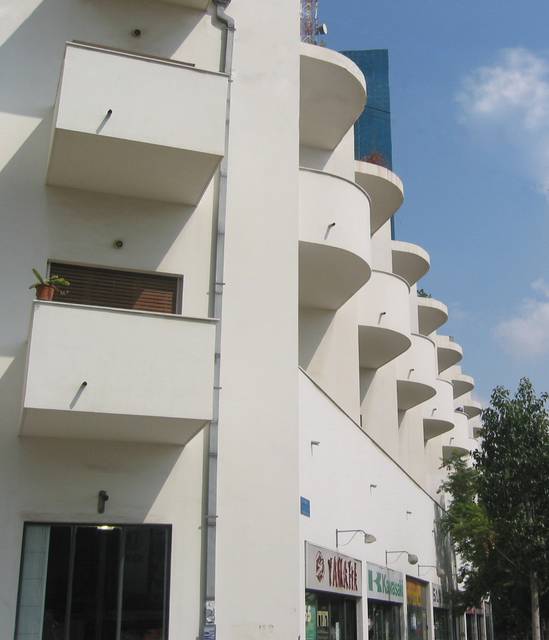 In July 2003 Tel Aviv-Yafo was declared a cultural UNESCO World Heritage site in recognition of the many "International" (or "Bauhaus") style buildings built here during the 1930s-50s. As this style emphasized simplicity and the color white, Tel Aviv is also called the White City.
In July 2003 Tel Aviv-Yafo was declared a cultural UNESCO World Heritage site in recognition of the many "International" (or "Bauhaus") style buildings built here during the 1930s-50s. As this style emphasized simplicity and the color white, Tel Aviv is also called the White City.
Tel Aviv lies alongside the Mediterranean coastline. Most points of interest for tourists are in the center district, a rectangle defined by the sea to the west, the Yarkon River to the north, the Ayalon highway to the east, and Salame Road to the south. Within this district, most of the attractions are to the west of Ibn Gabirol street, a large north-south street which divides the district into two roughly equal halves.
Tel Aviv developed from south to north. At the southwest corner of the center district you will find old Jaffa. To its north is the first Jewish neighborhood outside Jaffa, Neve Tzedek (meaning "Oasis of Justice"). To Neve Tzedek’s east is Florentin (a 1920s light-industry quarter founded by Jews from Salonika in Greece, that has turned into a trendy neighborhood for young people, albeit with a large population of older and poor people); and then the Central Bus Station area, now home to foreign workers from around the world.
To the north of Neve Tzedek is "Kerem Ha'Temanim" (the Yemenite Vineyard), a crowded but picturesque neighborhood dating to the early 20th century. East and north of here lies the city center, a chiefly residential area built in the 1920s and 1930s, where the majority of Bauhaus ("International") style architecture is to be found. Further north and east, the "old north" (not to be confused with "the north" on the other side of the Yarkon), is a more spacious residential area built during the 1940s and 1950s.
Tel Aviv residents often speak of a north-south divide in Tel Aviv-Yafo. The north is usually associated with a continental, chic, and suburbanite lifestyle centered around Kikar haMedina and "Ramat Aviv". To the south, the city takes on a more working-class and Middle Eastern, albeit evermore trendy, urban feel. North Tel Aviv is generally residential and family-oriented; Tel Aviv Center is the hipper-younger area with many single people and couples in their 20s and 30s; south Tel Aviv is a rapidly gentrifying area with a mixed population - from older working-class people to artists to migrant African workers.
- Watch out for bikes and scooters on main sidewalks. Tel Aviv's traffic is horrible and there is no metro system yet, so many people use them to get around.
- Smoking in restaurants is limited to specific parts of their outdoor seating - smoking is illegal in restaurants, but the law is rarely enforced.
- Dogs wearing muzzles on public transit are not aggressive monsters - there's a (sporadically enforced) law requiring muzzles on buses and trains.
- Taking kids to cafes and restaurants is completely normal, and the malls usually have kid play and breast-feeding areas.
- Israelis can be pretty aggressive about cutting in lines; don't feel guilty about body-blocking little old ladies, as they have no problem taking advantage of tourists to cut half a line.
- Shabbat is less dramatic in Tel Aviv than the rest of Israel, but stores like pharmacies and supermarkets close on Friday afternoon until Sunday morning. Whether restaurants and bodegos ("makolet"s) are open during Shabbat varies by neighborhood.
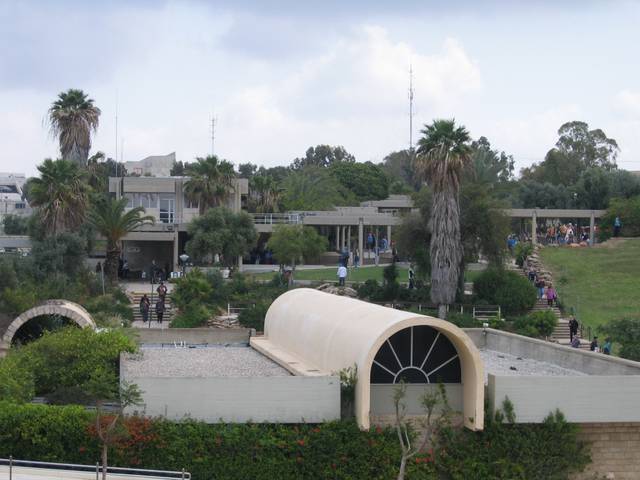
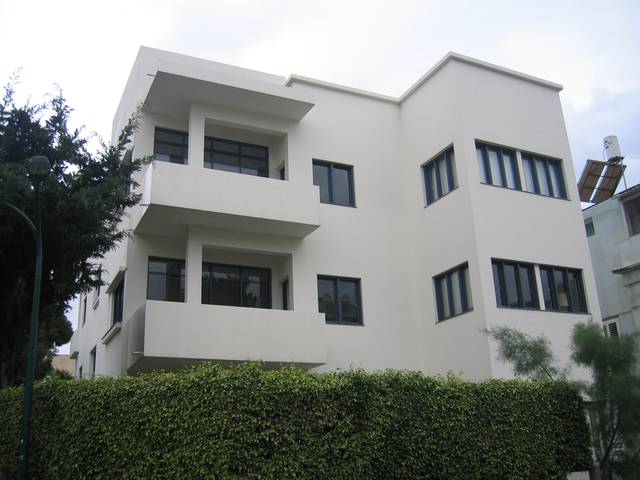
Tel Aviv is a big place, and these listings are just some highlights of things that you really should see if you can during your visit. The complete listings are found on each individual district page alongside many more things to see in each district.
- Yarkon park. Tel Aviv's central park along the Yarkon River
- Tel Aviv Port. One of the most dynamic areas in Tel Aviv, including a multitude of shops, restaurants and nightclubs.
Yarkon park. Tel Aviv's central park along the Yarkon River
Tel Aviv Port. One of the most dynamic areas in Tel Aviv, including a multitude of shops, restaurants and nightclubs.
- Rabin Square. The largest public square in Israel
- Carmel Market and Nachalat Binyamin arts and crafts fair. The largest and most famous market in Tel Aviv, Carmel Market open all week except Saturday. Nachalat Binyamin Arts and Crafts Fair is one of the most famous in the world. The art fair is open on Tuesdays 10am-6pm and Fridays 10am-5pm
- Habima Square. Home to a number of cultural institutions such as the Habima Theatre, the Fredric R. Mann Auditorium and the Helena Rubinstein Pavilion for Contemporary Art
- Azriely Center Observatory. Visitors can climb to the top of the mall for a nice view of the city. ₪22 for adults.
- Sarona. A district with restored German Templer architecture, known for its picturesque paths and buildings, upscale restaurants, and luxurious food market.
- Dizengoff Centre. Israel's most iconic shopping centre with a very lively food market every Thursday and Friday
- Rothschild Boulevard. A lot of Bauhaus architecture, restaurants and cafes in Tel Aviv's prettiest street
- Shore Promenade. Also called Tel Aviv beach promenade or "Shlomo Lahat" promenade
Rabin Square. The largest public square in Israel
Carmel Market and Nachalat Binyamin arts and crafts fair. The largest and most famous market in Tel Aviv, Carmel Market open all week except Saturday. Nachalat Binyamin Arts and Crafts Fair is one of the most famous in the world. The art fair is open on Tuesdays 10am-6pm and Fridays 10am-5pm
Habima Square. Home to a number of cultural institutions such as the Habima Theatre, the Fredric R. Mann Auditorium and the Helena Rubinstein Pavilion for Contemporary Art
Azriely Center Observatory. Visitors can climb to the top of the mall for a nice view of the city. ₪22 for adults.
Sarona. A district with restored German Templer architecture, known for its picturesque paths and buildings, upscale restaurants, and luxurious food market.
Dizengoff Centre. Israel's most iconic shopping centre with a very lively food market every Thursday and Friday
Rothschild Boulevard. A lot of Bauhaus architecture, restaurants and cafes in Tel Aviv's prettiest street
Shore Promenade. Also called Tel Aviv beach promenade or "Shlomo Lahat" promenade
- Florentin neighborhood. A previously run-down but beautiful area, which is now gentrifying
- Central Bus Station. Planned by overambitious architects, its incomprehensible vastness, multiple levels and intertwining corridors make it a model for what an urban jungle would feel like
- Levinsky Market. An extremely colorful outside market
Florentin neighborhood. A previously run-down but beautiful area, which is now gentrifying
Central Bus Station. Planned by overambitious architects, its incomprehensible vastness, multiple levels and intertwining corridors make it a model for what an urban jungle would feel like
Levinsky Market. An extremely colorful outside market
- Jaffa Clock Tower.
- Old Jaffa & Port. One of the oldest ports in the world, now a must-see, holds various shops, restaurants and events
- Flea Market & Bazaar. An outdoor market where you can buy almost anything for low prices
Jaffa Clock Tower.
Old Jaffa & Port. One of the oldest ports in the world, now a must-see, holds various shops, restaurants and events
Flea Market & Bazaar. An outdoor market where you can buy almost anything for low prices
- Park Ariel Sharon. Daily 09:00-15:30 (it's closed for a few holidays). A large park that is being developed on the southeast outskirts of Tel Aviv. It contains the massive "Hiriya" garbage dump, which is being redeveloped as a nature and recreation site. You can visit the top of the 80m-high garbage mound, which is quite pleasant and has a stunning view of the Tel Aviv skyline. Park your car at the site entrance and wait for a shuttle to take you up (the last shuttle leaves around 15:00). You can also walk up on foot, if you can deal with the smell of a garbage reprocessing facility which still operates (due to the prevailing winds, there are no smells on top of the mound). Free admission.
Park Ariel Sharon. Daily 09:00-15:30 (it's closed for a few holidays). A large park that is being developed on the southeast outskirts of Tel Aviv. It contains the massive "Hiriya" garbage dump, which is being redeveloped as a nature and recreation site. You can visit the top of the 80m-high garbage mound, which is quite pleasant and has a stunning view of the Tel Aviv skyline. Park your car at the site entrance and wait for a shuttle to take you up (the last shuttle leaves around 15:00). You can also walk up on foot, if you can deal with the smell of a garbage reprocessing facility which still operates (due to the prevailing winds, there are no smells on top of the mound). Free admission.
Tel Aviv is home to a large number of museums. Some of the best known ones are Beit HaTefutsot (the Museum of the Jewish Diaspora) and the Land of Israel Museum in North Tel Aviv, and the Tel Aviv Museum of Art in the center. Also worth visiting is Bialik Square, a beautiful Bauhaus square including the following museums: Bauhaus Center Tel Aviv, Bialik House, The Museum of Town History, Rubin Art Museum.
While Tel Aviv's population tends to be politically dovish and involved in peace activism, Tel Aviv is nevertheless home to many of Israel's military museums, which record an important aspect of Israel's history. Leading up to 1948 there were a number of different Jewish militias - the mainstream Haganah, the elite Palmach, the right-wing Etzel (Irgun), and the more-right-wing Lehi (Stern Gang) - and each has a museum of its own in modern Tel Aviv. Ideally, one should see two museums corresponding to different parts of the political spectrum - the Palmach Museum and Etzel 1948 Museum are recommended - to get an nuanced overall view. In some museums, you can hear personal stories from veterans who volunteer there - call ahead of time to find out. If you are interested in physical military artifacts like tanks and rifles, the place to go is the IDF History Museum, which has a large connection of these artifacts.
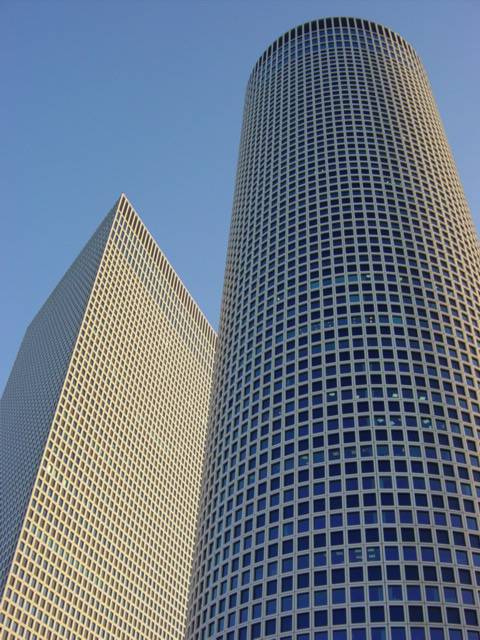
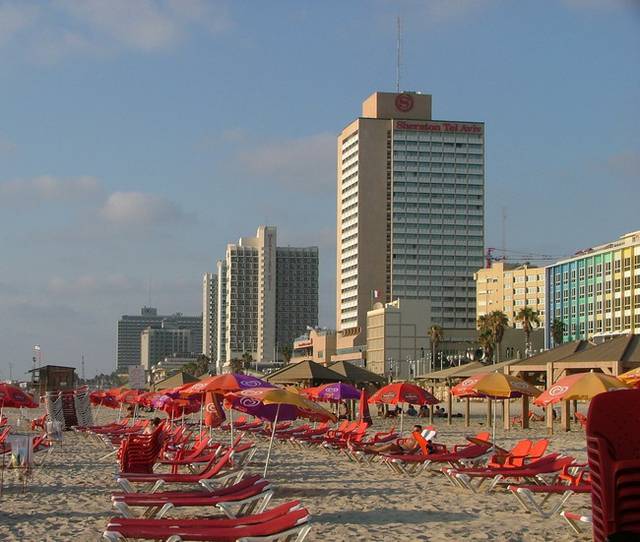
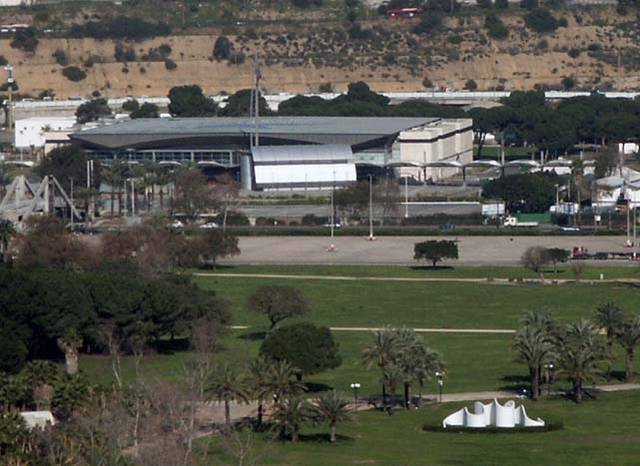
There’s a lot to do in Tel Aviv. For the biggest selection, check out the individual district articles. These are some of the highlights.
Tel Aviv is known as the White City with the world's largest collection of Bauhaus architecture. Enjoy a guided tour of the Bauhaus district.
A visit to Tel Aviv isn't complete without a dip into its fantastic beach scene which is at its best in summer, especially during Friday afternoons, when crowds of buff beachgoers converge to take in the Brazilian drums, the smell of barbecues, the thwock, thwock of "matkot" as the sun sets. In early summer be careful as there may be jellyfish in the water. Ask the lifeguard or locals about the current conditions.
An interesting way of getting to see the city is to rent a bike and bike the length of the coastal boardwalk from Jaffa to Tel Aviv Port, then turning inland and biking along the Yarkon River banks, then returning to where you started. The entire trip is on paved bike paths, and can be as long as 13km each way, or shorter if you prefer.
Tel Aviv has the widest selection of performing arts in Israel.
- Fans of classical music might enjoy Israel's Philharmonic Orchestra and the New Israel Opera.
- The Barby (52, Kibutz Galuyot st., +972 3-5188123), and the Goldstar Zappa (24, Habarzel st., +972 3-6499550) present Israeli (and sometimes foreign) rock daily.
- For more alternative and indie music with occasional jazz shows and electronic parties, head to Levontin 7 named after its street address or The OzenBar.
- Tmuna Theater (8, Shontsino st., +972 3-5629462) alternates between local acts, both famous and unknown, and fringe theater productions in Hebrew.
- Dance can be enjoyed in Suzanna Dellal Center in Neve Tzedek.
- Theater is mostly performed in Hebrew, naturally, but English interpretation is available is some of the shows for extra-fees in Habima National Theater (+972 3-6295555) and HaCameri Municipal Theater.
- Fans of jazz can find great shows at the Shablul club in the Tel-Aviv harbor, with jam sessions every Monday at 22:30.
Fans of classical music might enjoy Israel's Philharmonic Orchestra and the New Israel Opera.
The Barby (52, Kibutz Galuyot st., +972 3-5188123), and the Goldstar Zappa (24, Habarzel st., +972 3-6499550) present Israeli (and sometimes foreign) rock daily.
For more alternative and indie music with occasional jazz shows and electronic parties, head to Levontin 7 named after its street address or The OzenBar.
Tmuna Theater (8, Shontsino st., +972 3-5629462) alternates between local acts, both famous and unknown, and fringe theater productions in Hebrew.
Dance can be enjoyed in Suzanna Dellal Center in [[Tel Aviv/Neve Tzedek|Neve Tzedek]].
Theater is mostly performed in Hebrew, naturally, but English interpretation is available is some of the shows for extra-fees in Habima National Theater (+972 3-6295555) and HaCameri Municipal Theater.
Fans of jazz can find great shows at the Shablul club in the Tel-Aviv harbor, with jam sessions every Monday at 22:30.
Football (soccer) is the most popular sport in Israel. Tel Aviv has 3 major football clubs that are usually in Ligat Ha'al (top division): Maccabi Tel Aviv, Hapoel Tel Aviv, and Bnei Yehudah. All three normally play in the Bloomfield Stadium in the southern part of the city, but it is closed for reconstruction. For the time-being, games are being played out of town.
Basketball is somewhat less popular among locals than football, but the Maccabi Tel Aviv basketball team is well known as the most successful club in Israel and one of the best in Europe, dominating the Israeli basketball league with over 40 championship seasons and 5 European titles. The Hapoel Tel Aviv team is less successful and popular. Maccabi Tel Aviv plays in the Menora Mivtachim Arena in the eastern part of the city.
Matchs between Hapoel and Maccabi Tel Aviv are major events in the city, as the teams are as huge rivals as they come.
Good martial arts clubs abound in various parts of the city, ranging from modern fitness craze sports to traditional ones.
Scuba-diving: there's a couple of dive shacks and centers based near the Marina. Diving in the Med is really for experienced folk: there are interesting wrecks, and fabulous ancient treasures have recently been discovered in these waters. But compared to the Red Sea it's distinctly dark and barren down there, and the weather and sea conditions are tougher. Those wanting to learn, or novice divers, will do much better down in Eilat or elsewhere along the Red Sea coast.
Tel Aviv hosts many festivals and events. Something is going on almost every weekend so make sure you're updated!
- White Night Festival. This annual event is a celebration of Tel Aviv's White City's proclamation as a UNESCO World Cultural Heritage Site and organized by Tel Aviv's municipality. During the "White Night", cultural institutions, as well as commercial ones, are open to the public all night long, and many special events take place. In 2019 the event will coincide with the second semi final of the Eurovision song contest in Tel Aviv, though in the past it usually took place late June or early July.
- Tel Aviv Fashion Market. A highly recommended biannual event (winter/summer, for three days each time) where Tel Aviv's top clothing designers show and sell their stuff. Focused on urban clothing. Don't miss this colorful carnival of cutting-edge fashion!
- Night Flea. Every August, Jaffa's burgeoning flea market is active all through the night on weekends, with special events, shows and exhibitions taking place.
- Docaviv, The Tel Aviv Cinematheque, 2 Shprintzak St. Tel Aviv's International Documentary Film Festival. Every year in May, Docaviv presents the most innovative, provocative and important documentary films of the year from around the world.
- The Tel Aviv International LGBT Film Festival, The Tel Aviv Cinematheque, 2 Shprintzak St. Lesbian/gay/bisexual/transgender film festival. Celebrating gender diversity. Happening in June.
- The Tel Aviv International Student Film Festival, The Tel Aviv Cinematheque, 2 Shprintzak St. One of the world's most important student film festivals. Happening in late May.
- Ta'am Ha'ir, HaYarkon Park. 18:00-22:00. "Taste of the City", an annual 4-day food fair, which takes place in Hayarkon Park at the beginning of summer (late May of June). Top restaurants present and sell samples of their finest dishes for special prices. The festival has been held under several names (e.g. Tel-Aviv-Eat), in different locations, and sometimes in cities other than Tel Aviv. Make sure to check the details.
White Night Festival. This annual event is a celebration of Tel Aviv's White City's proclamation as a UNESCO World Cultural Heritage Site and organized by Tel Aviv's municipality. During the "White Night", cultural institutions, as well as commercial ones, are open to the public all night long, and many special events take place. In 2019 the event will coincide with the second semi final of the Eurovision song contest in Tel Aviv, though in the past it usually took place late June or early July.
Tel Aviv Fashion Market. A highly recommended biannual event (winter/summer, for three days each time) where Tel Aviv's top clothing designers show and sell their stuff. Focused on urban clothing. Don't miss this colorful carnival of cutting-edge fashion!
Night Flea. Every August, Jaffa's burgeoning flea market is active all through the night on weekends, with special events, shows and exhibitions taking place.
Docaviv, The Tel Aviv Cinematheque, 2 Shprintzak St. Tel Aviv's International Documentary Film Festival. Every year in May, Docaviv presents the most innovative, provocative and important documentary films of the year from around the world.
The Tel Aviv International LGBT Film Festival, The Tel Aviv Cinematheque, 2 Shprintzak St. Lesbian/gay/bisexual/transgender film festival. Celebrating gender diversity. Happening in June.
The Tel Aviv International Student Film Festival, The Tel Aviv Cinematheque, 2 Shprintzak St. One of the world's most important student film festivals. Happening in late May.
Ta'am Ha'ir, HaYarkon Park. 18:00-22:00. "Taste of the City", an annual 4-day food fair, which takes place in Hayarkon Park at the beginning of summer (late May of June). Top restaurants present and sell samples of their finest dishes for special prices. The festival has been held under several names (e.g. Tel-Aviv-Eat), in different locations, and sometimes in cities other than Tel Aviv. Make sure to check the details.
Tel Aviv's markets are the best show in town, and they're bustling all day long. A Middle Eastern mélange of tastes, scents, sounds, colors – and lots of people. Friday is the busiest day when most Israelis do their shopping until the afternoon. Closed Saturdays.
Tel Aviv's most famous market is the Carmel Market, which mostly sells fruit and vegetables, but also candy, clothing, toys, cellphone accessories, kitchen gadgets, and other goods. It is in Tel Aviv Center not far from the beach. The Levinsky Market, not far to the south, is the best place to buy spices, dried fruits, and different kinds of legume. A more upscale option is the Sarona Market, which has a variety of luxury foods and restaurants in picturesque surroundings. Finally, HaTikva Market in the southeast of the city is reputed to be the most "authentic" market, keeping its atmosphere as the other markets have gentrified somewhat.
If you are interested in furniture, antiques, or arts and crafts, there are markets for this too. At the Jaffa flea market, stretching over a number of streets in the old Jaffa district, you can find almost anything, but it is best for antiques. The Nachalat Binyamin arts and crafts market and Dizengoff antiques and secondhand market in Central Tel Aviv are equally good, but are only open two days a week.
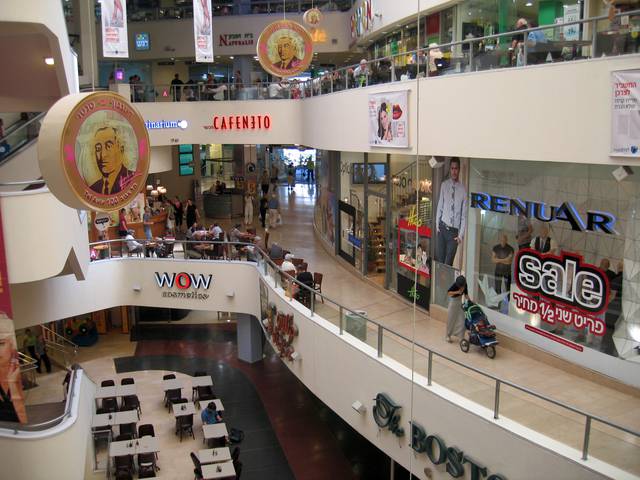 As malls are good places to catch some air-conditioning during hot Israeli summers, they have quickly become a preferred place of entertainment for the locals. The variety is usually mid-range, mainstream, with both international and local brands.
As malls are good places to catch some air-conditioning during hot Israeli summers, they have quickly become a preferred place of entertainment for the locals. The variety is usually mid-range, mainstream, with both international and local brands.
In Tel Aviv Center, Azrieli Center is the busiest mall. This area is also home to Dizengoff Center, the first mall built in Israel, as well as Gan Ha'ir, which is next to Rabin Square.
North Tel Aviv is the most upscale part of the city, and unsurprisingly the Ramat Aviv mall is also upscale.
The New Central Bus Station, designed as a combined bus station and mall, has large numbers of stores which now cater to a lower-class crowd, particularly migrants and workers from Third World countries. There are also a large number of vacant stores.
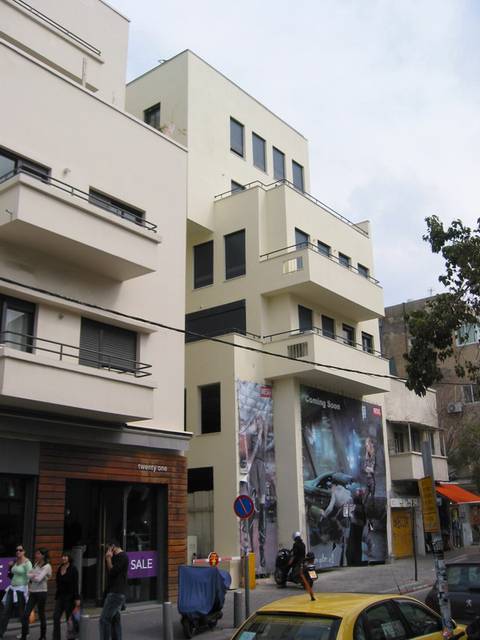 The air-conditioned malls threaten to destroy the concept of shopping streets, but many of the more special ones still survive, particularly in the city center.
The air-conditioned malls threaten to destroy the concept of shopping streets, but many of the more special ones still survive, particularly in the city center.
Dizengoff Street is popular with the shoppers, as the street is peppered with numerous specialty shops, cafes, and restaurants, as well as the sprawling Dizengoff Center Mall.
Shenkin Street is known for its trendy cafes as well as designer clothing shops.
Second-hand clothing shops are getting very popular in Tel Aviv and you'll find them scattered all over the city.
The country's widespread Steimatzky and Zomet Sfarim chains are a good source for current books. Almost every shop has at least a selection in English. Allenby St. has a number of second hand bookshops, most sell (and buy) English books. For music, check out Tower Records shop in the opera tower, on the corner of Alenby and Herbert Samuel. For the more alternative crowd, Krembo Records in Shenkin Street and Third Ear on King George Street will satisfy your needs.
Gordon Street is famous for its art galleries. Ben-Yehuda Street has several Judaica/Jewelery/souvenirs shops. You can buy jewelry from Michal Negrin, a world-famous Israeli designer, in her shops at the Azriely mall and on Sheinkin st. The prices are much better than abroad. For more original crafts and Judaica, try the Nahlat Binyamin craft market mentioned above.
Tel Aviv has an amazing variety of restaurants for every taste.
There are plenty of fast food restaurants, offering both international and local Israeli food. One can get a decent and inexpensive meal, including felafel or hummous on every street corner. You can also eat a toast, sandwich or some other snack at one of the cafes around the city. Many fruit juice parlors are around.
Raphael and Messa are considered to be Tel Aviv's most elegant restaurants, serving gourmet and unique plates, inspired both by local and foreign cuisine although not kosher. There are many good kosher restaurants in Tel Aviv including Meatos, Bruno and of course 2C which although pricey, offers gourmet food with great views of the city as it is at the very top of the Azrieli round tower.
The city is also known for being one of the best destinations for plant based eating. More than 30 restaurants cater to vegans with a wide range of cuisines and price ranges. The landmarks are Meshek Barzilai in Neve Tzedek, Anastasia on Frishman street and 416 near Sarona. You will also find many plant based options on the menu of most restaurants.
Finally, Tel Aviv's ice cream parlors offer much more than basic flavors, as the taste buds are eclectic and strive for new flavors, such as Halva, poppy seed, and even a touch of alcoholic liqueurs in the ice cream (Try these places: Vaniglia, Iceberg, Gelateria Siciliana, Dr. Lek and Aldo).
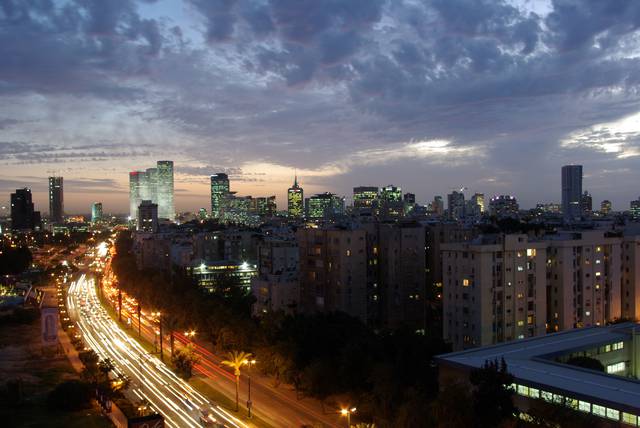 Tel Aviv is called "The city that never stops" by tourists and locals alike. It has a wide range of pubs, bars, clubs and it is known worldwide for its nightlife. The entire city is crawling with nightlife attractions and you would actually have to work pretty hard to find yourself further than 500 meters away from a place to have a drink. People from all the surrounding region come to Tel Aviv to have a drink or a party so on weekends traffic is hectic at late hours and finding a parking spot is somewhere between hard and impossible (so sticking to cabs is not a bad idea). Buses stop running at sundown on Friday and only start again after sundown on Saturday, so if you go out on Friday night you may find yourself forced to take a cab if you cannot walk! But any day is a good day to party in Tel Aviv, not just the weekends.
Tel Aviv is called "The city that never stops" by tourists and locals alike. It has a wide range of pubs, bars, clubs and it is known worldwide for its nightlife. The entire city is crawling with nightlife attractions and you would actually have to work pretty hard to find yourself further than 500 meters away from a place to have a drink. People from all the surrounding region come to Tel Aviv to have a drink or a party so on weekends traffic is hectic at late hours and finding a parking spot is somewhere between hard and impossible (so sticking to cabs is not a bad idea). Buses stop running at sundown on Friday and only start again after sundown on Saturday, so if you go out on Friday night you may find yourself forced to take a cab if you cannot walk! But any day is a good day to party in Tel Aviv, not just the weekends.
New places are opening and closing every day and the "hottest spots" change every couple of months, so no internet guide will be able to direct you to the hippest place (even though some may try). Checkout up to date event and party sites. Many places in Tel Aviv have minimum age limitations that vary from 18 to 30. Usually the limitation is different between males and females and while some spots may be flexible others will be as strict as possible.
Israel has no unique drinking culture so any place with any self-respect will have the entire world wide alcohol selection available, from Wine and Beer to Tequila, Arak, Vodka, Whiskey and Cognac. One of the most popular drinks is the local Goldstar beer and the Arabic drink, Arak (it means "sweat" in Arabic) was all the rage in pubs and bars in 2010.
The entire city is full of spots to hang out, and there are streets and areas that stand out with even more pubs/clubs, have a look at the districts detailing the scene.
There are a few well-known pubs that specifically cater to foreigners. Mike's Place, next to the American embassy, is an American-style bar which attracts a mostly-Anglo 20-30 something crowd. Molly Bloom's Irish pub and the English Pub, not far from Mike's Place, host many people from the UK and Republic of Ireland.
The Tel Aviv club scene is comparable to those in most European capitals. Top international DJs regularly perform in Tel Aviv, with clubs constantly vying to outdo each other with ever more extravagant parties. Up to date English language party listings are readily available online.
The biggest and newest club in the city is Haoman 17 (Florentin quarter). Other fantastic clubs are TLV, Dome (gay & Offer Nissim is the resident DJ), Vox, Powder, and the "indie" Cafe Barzilay and Studio 46.
Rock clubs, including Barbie Club (Kibutz Galuyot St) and the Zappa Club (in the northeastern neighbourhood of Ramat haChayal), among others, host concerts almost every night of the week.
Billiards (pool) clubs include Gypsy on Kikar Atarim (Atarim plaza)
Tel Aviv is home to the leading gay community in Israel and all of the Middle-East, and is a very friendly city towards gay people. It's safe in Tel Aviv for gay couples to express physical affection to the same extent as straight ones, and can do so on all beaches (the "gay beach" is good for pick-ups, but safety isn't limited to there).
There are many gay clubs and parties. Some of which have been running for several years already (Shirazi's FFF line, which is taking place in the 'Haoman 17' club. The electro 'PAG' line). Others are changing from time to time. There is also a gay accommodation.
Most gay clubs have closed as the younger generation of gay Israelis just go clubbing with their straight friends. Many clubs do have gay nights, though.
There is a gay beach in the city, Hilton Beach, named for the Hilton Hotel adjacent to it. It is often full of young gay Israelis, especially in the weekends. Next to Dizengoff Center and on Rothschild Boulevard you may see gay couples walking freely all day long.
Coffee shops have been an inseparable part of the Tel Aviv cultural lifestyle ever since the city was founded, as cafés were always the favorite hanging spots of the local bohemia. It is therefore no surprise that Tel Aviv boasts many cafés, which can be found everywhere in the city, offering aromatic Italian Espressos and Capuccinos (called "Hafukh", meaning upside-down, in Hebrew). Espresso-bar, Cafeneto, Café-café and arcaffé are some of the local chain-cafés. Aroma's the biggest among them. Feel free to spend hours in a coffee shop - no one will slap the check on your table or require you to order more stuff.
Bohemian 'Puah' (in the Jaffa flea market), Café Noah, Chic 'Le Central' (Rothschild Av.), and 'Tolaat Sfarim' (Rabin Sq. and Mazeh street near Allenby and Rothschild) are recommended for their very distinctive and Israeli café-drinking experience.
Most coffee shops and fast food places have free WiFi. Tel Aviv municipality operates a free Wi-Fi network called "Free_TLV" in select locations around the city.
- Tel Aviv Doctor, Basel Heights Medical Centre - Room 204, 35 Basel Street (on the square), +972 (0) 549 41 42 43. Tel Aviv Doctor provides English speaking medical services that can be claimed back from travel insurance companies.
Tel Aviv Doctor, Basel Heights Medical Centre - Room 204, 35 Basel Street (on the square), +972 (0) 549 41 42 43. Tel Aviv Doctor provides English speaking medical services that can be claimed back from travel insurance companies.
Many details can also be found here: https://www.embassypages.com/israel
- Australia Australia, Level 28, Discount Bank Tower, 23 Yehuda Halevi St, +972 3 693 5000. M-Th 08:00-12:30 and 13:00-16:00, F 08:00-13:00.
- Canada Canada, Canada House, 3/5 Nirim St, +972 3 636 3300. M-F 08:00-11:00.
- China China, 219 Ben Yehuda St, +972 3 546 7242.
- Denmark Denmark, 11th floor, Museum Tower, 4 Berkowitz St, +972 3 608 5850.
- Ecuador Ecuador, Beit Asia Building, 4 Weizmann St, +972 3 695.
- Egypt Egypt, 54, Rehov Basel, +972 3 5464151, +972 3 5464152.
- Finland Finland, Kanion Ramat Aviv (9th floor) Einstein Street 40, +972 3-745 6600. M-Th 08:15-16:15, F 08:15-15:00.
- France France, 1/3 Ben Yehuda Street, +972 3 520 8500. M-F 08:00-12:30.
- Germany Germany, 19th floor, 3 Daniel Frish, +972 3 693 1313.
- Greece Greece, 3, Daniel Frisch, +972 3 695 3060, +972 3 609 4981, +972 5 4304 4098 (Emergency).
- Ireland Ireland, 3 Daniel Frisch, +972 3-6964166.
- Italy Italy, Trade Tower 25, Hamered St, +972 3 510 4004.
- Japan Japan, 19th and 20th floors, Museum Tower, 4 Berkowitz St, +972 3 695 7282. M-Th 09:00-17:00, F 09:30-15:00.
- Mexico Mexico, 25 Hamared St, Trade Tower, 5th floor =, +972 3 516 3532. M-Th 08:30-15:30, F 08:30-13:30.
- Norway Norway, 40 Einstein St, Canion Ramat Aviv, 13th floor, +972 3 740 1900. M-Th 08:30-16:00, F 08:30-15:30.
- Panama Panama, 13th floor, Beit Yechin Building, 2 Kaplan St, +972 3 575 9793.
- Philippines Philippines, 18 Bnei Dan St, +972 3 601 0500. Su-Th 08:30-16:30.
- Poland Poland, 16 Soutine St, +972 3 72 53 111.
- Serbia Serbia, 10 Bodenheimer St, +972 3 604 5535.
- Singapore Singapore, 12th floor, Building No. 4, Atidim Industrial Park, +972 3 649 2271.
- Spain Spain, 18th floor, 3 Daniel Frish, +972 3 769 7900.
- Sweden Sweden, 24th floor, Adgar 360 Building, 2 Haslosha St, +972 3 718 0000. M-Th 10:00-12:00 and 13:30-15:30.
- Switzerland Switzerland, 228 Hayarkon St, +972 3 546 4455. M-Th 08:00-12:30 and 13:30-16:00 and F 08:00-12:00.
- Taiwan Taiwan (de facto embassy), Taipei Economic and Cultural Office, 21st floor, Azireli Center, Round Building, 132 Menachem Begin Rd, +972 3 607 4788.
- United Kingdom United Kingdom, 192 Hayakron St, +972 3 725 1222. M-Th 08:00-16:00, F 08:00-13:30.
- the United States United States, 71 Hayarkon St, +972 3 519 7475. This is considered to be a branch office, as the U.S. maintains its official embassy to Israel in Jerusalem.
- Vietnam Vietnam, 4th floor, Beit Asia Building, 4 Weizman St, +972 3 696 6304.
Australia Australia, Level 28, Discount Bank Tower, 23 Yehuda Halevi St, +972 3 693 5000. M-Th 08:00-12:30 and 13:00-16:00, F 08:00-13:00.
Canada Canada, Canada House, 3/5 Nirim St, +972 3 636 3300. M-F 08:00-11:00.
China China, 219 Ben Yehuda St, +972 3 546 7242.
Denmark Denmark, 11th floor, Museum Tower, 4 Berkowitz St, +972 3 608 5850.
Ecuador Ecuador, Beit Asia Building, 4 Weizmann St, +972 3 695.
Egypt Egypt, 54, Rehov Basel, +972 3 5464151, +972 3 5464152.
Finland Finland, Kanion Ramat Aviv (9th floor) Einstein Street 40, +972 3-745 6600. M-Th 08:15-16:15, F 08:15-15:00.
France France, 1/3 Ben Yehuda Street, +972 3 520 8500. M-F 08:00-12:30.
Germany Germany, 19th floor, 3 Daniel Frish, +972 3 693 1313.
Greece Greece, 3, Daniel Frisch, +972 3 695 3060, +972 3 609 4981, +972 5 4304 4098 (Emergency).
Ireland Ireland, 3 Daniel Frisch, +972 3-6964166.
Italy Italy, Trade Tower 25, Hamered St, +972 3 510 4004.
Japan Japan, 19th and 20th floors, Museum Tower, 4 Berkowitz St, +972 3 695 7282. M-Th 09:00-17:00, F 09:30-15:00.
Mexico Mexico, 25 Hamared St, Trade Tower, 5th floor =, +972 3 516 3532. M-Th 08:30-15:30, F 08:30-13:30.
Norway Norway, 40 Einstein St, Canion Ramat Aviv, 13th floor, +972 3 740 1900. M-Th 08:30-16:00, F 08:30-15:30.
Panama Panama, 13th floor, Beit Yechin Building, 2 Kaplan St, +972 3 575 9793.
Philippines Philippines, 18 Bnei Dan St, +972 3 601 0500. Su-Th 08:30-16:30.
Poland Poland, 16 Soutine St, +972 3 72 53 111.
Serbia Serbia, 10 Bodenheimer St, +972 3 604 5535.
Singapore Singapore, 12th floor, Building No. 4, Atidim Industrial Park, +972 3 649 2271.
Spain Spain, 18th floor, 3 Daniel Frish, +972 3 769 7900.
Sweden Sweden, 24th floor, Adgar 360 Building, 2 Haslosha St, +972 3 718 0000. M-Th 10:00-12:00 and 13:30-15:30.
Switzerland Switzerland, 228 Hayarkon St, +972 3 546 4455. M-Th 08:00-12:30 and 13:30-16:00 and F 08:00-12:00.
Taiwan Taiwan (de facto embassy), Taipei Economic and Cultural Office, 21st floor, Azireli Center, Round Building, 132 Menachem Begin Rd, +972 3 607 4788.
United Kingdom United Kingdom, 192 Hayakron St, +972 3 725 1222. M-Th 08:00-16:00, F 08:00-13:30.
the United States United States, 71 Hayarkon St, +972 3 519 7475. This is considered to be a branch office, as the U.S. maintains its official embassy to Israel in [[Jerusalem]].
Vietnam Vietnam, 4th floor, Beit Asia Building, 4 Weizman St, +972 3 696 6304.
Regular crime rates are much lower in Tel Aviv (and in all of Israel) than in most other cities of similar size. Pickpockets are not a big problem, but you should be aware mostly in HaCarmel Market, Nachlat Binyamin market, the central bus station, the beach promenade and all of Jaffa and the flea market area. Although street crime is rare all around Tel Aviv, it would be best advised to avoid walking parks alone at night, or wandering alone in the southern neighborhoods late at night, which are a bit more rugged (in and around the central bus terminal, and south of Salame/Eilat Street including Jaffa - except Florentin). If necessary, a companion would be a good idea.
Terrorist incidents have decreased in the past decade and are extremely rare. Nonetheless, the usual warnings regarding being alert for bomb threats also pertain to Tel Aviv - beware of suspicious packages in public places (though don't over panic), and suspicious behavior on the part of people around you; if in doubt, report it! The local police are generally very friendly, and many of the law-enforcers can speak understandable English.
Security control checks are a necessary annoyance when entering shopping malls, markets the central bus station, and most hotels, cafes and restaurant. You are frequently requested to let the guards look into your bag. It is best not to find it offensive or intrusive, and this check shouldn't take more than 20 seconds and end with a smile and a green light. It is also advised to carry some sort of identification documents on you at all times. Policeman may rarely stop and ask you for ID, and Israelis are required to carry an ID at all times.
Most Israelis aged 18-20 are doing mandatory army service. So teenagers in uniform are everywhere, and it is not unusual to see what appears to be a group of high school students, dressed like any other high schools students out on the weekend, all carrying rifles.
City buses are safe at all times of day and night, frequent, cheap, reliable and convenient. There is no need to worry about terrorism - it has been years since the last bombing on any Israeli bus. You can always approach the driver with any questions, and passengers are usually keen to assist tourists.
Tel Aviv has long, hot summers. Be sure to drink lots of water, even if you don't feel thirsty, and use lots of sunscreen.
When going for a swim in the Mediterranean, stick to the patrolled beaches with lifeguards, marked with flags and signs - every year people drown off the Tel Aviv coast when strong currents get them into difficulties. Also, at the beginning of the summer, keep an eye out for jellyfish (called meduza in Hebrew). Remember that during the winter months, though the weather may allow a bathe, the lifeguard service is inactive (official bathing season begins on April 18th and ends late in October).
- Haifa – The second-holiest city in the Bahai faith, including its great garden down the northern slope of the city.
- Jezreel Valley – Famous for Tel Megiddo (Armageddon) National Park and Mount Gilboa overlooking it.
- Druze Villages in the Carmel Range: 30 min by service taxi (monit sherut) or longer by bus, line number 37א, to the closer village of Isifya or the more distant village of Daliyat el-Carmel. The tourist-oriented bazaar has inexpensive shops and you can top off the visit in one of the excellent Mid-Eastern restaurants.
- Caesarea & Zarqa Bay – Extensive archaeological site north along the coast, and beautiful but not crowded beaches.
- Jerusalem – an ancient city holy to the three Abrahamic religions
- Dead Sea – at the lowest point in the world, it's a sea so salty that virtually nothing can live in it and swimmers float without even trying
- Hebron – BTS offers tours of this city under occupation in the West Bank. Bus leaves from Tel Aviv, registration required in advance.
